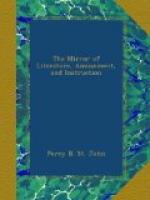“Their mode of life is very regular: they breakfast together alone about eleven: at half-past twelve she came in to sit to me, accompanied by Prince Leopold, who stayed great part of the time: about three she would leave the painting-room, to take her airing round the grounds in a low phaeton with her ponies, the prince always walking by her side; at five she would come in and sit to me till seven; at six, or before it, he would go out with his gun to shoot either hares or rabbits, and return about seven or half-past; soon after which we went to dinner, the prince and princess appearing in the drawing-room just as it was served up. Soon after the dessert appeared, the prince and princess retired to the drawing-room, whence we soon heard the piano accompanying their voices. At his own time, Colonel Addenbrooke, the chamberlain, proposed our going in, always, as I thought, to disturb them.”
“After coffee, the card-table was brought, and they sat down to whist, the young couple being always partners, the others changing. You know my superiority at whist, and the unfairness of my sitting down with unskilful players; I therefore did not obey command, and from ignorance of the delicacy of my motives, am recommended to study Hoyle before my second visit there next week, which indeed must be a very short one.”
“The prince and princess retire at eleven o’clock.”
We leave out the link in the narrative that connects this pleasant description with the melancholy scene described in the following (for it is written in a sad taste) and only add, that the most amiable and beloved of women died within a month from the date of the above letter.
“Popular love and the enthusiasm of sorrow, never towards greatness, perhaps so real, saw in her a promised Elizabeth, and while yet she lived it was a character which I should sincerely have assigned to her, as that which she would most nearly have approached: certain I am that she would have been a true monarch—have loved her people: charity and justice, high integrity (as I have stated), frankness and humanity, were essentials and fixed in her character: her mind seemed to have nothing of subtlety or littleness in it, and she had all the courage of her station.”
“She once said, ’I am a great coward, but I bluster it out like the best of them till the danger’s over.’ I was told by one of the members of the council awaiting her delivery, that Dr. Baillie came in, and said in answer to some inquiries, ’She’s doing very well: she’ll not die of fear: she puts a good Brunswick face upon the matter.’ She had a surprisingly quick ear, which I was pleasantly warned of: whilst playing whist, which being played for shillings, was not the most silent game I ever witnessed, she would suddenly reply to something that the baron or I would be talking of, in the lowest tone, at the end of the room, whilst her companions at the table were ignorant of the cause of her observations.”




